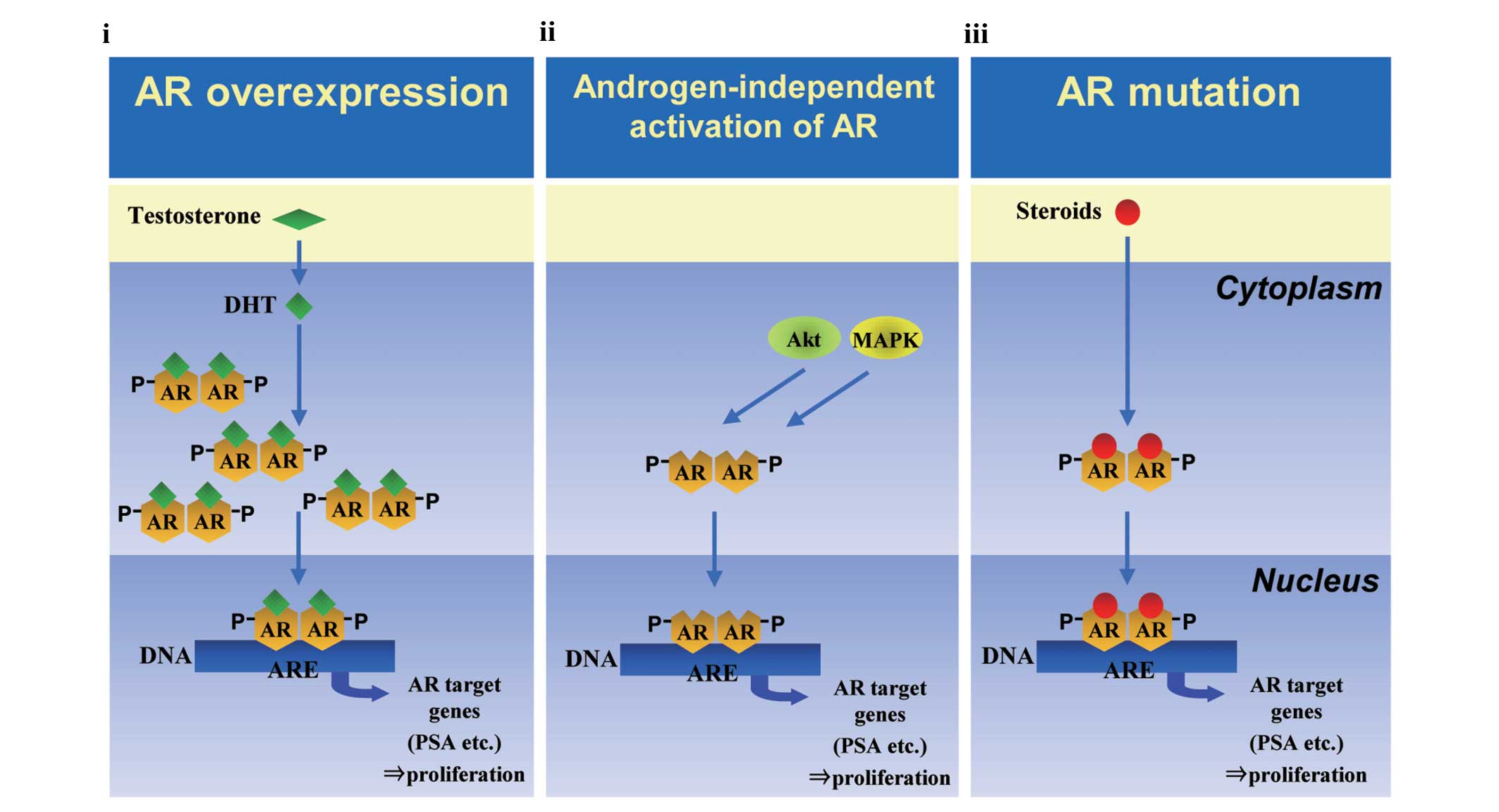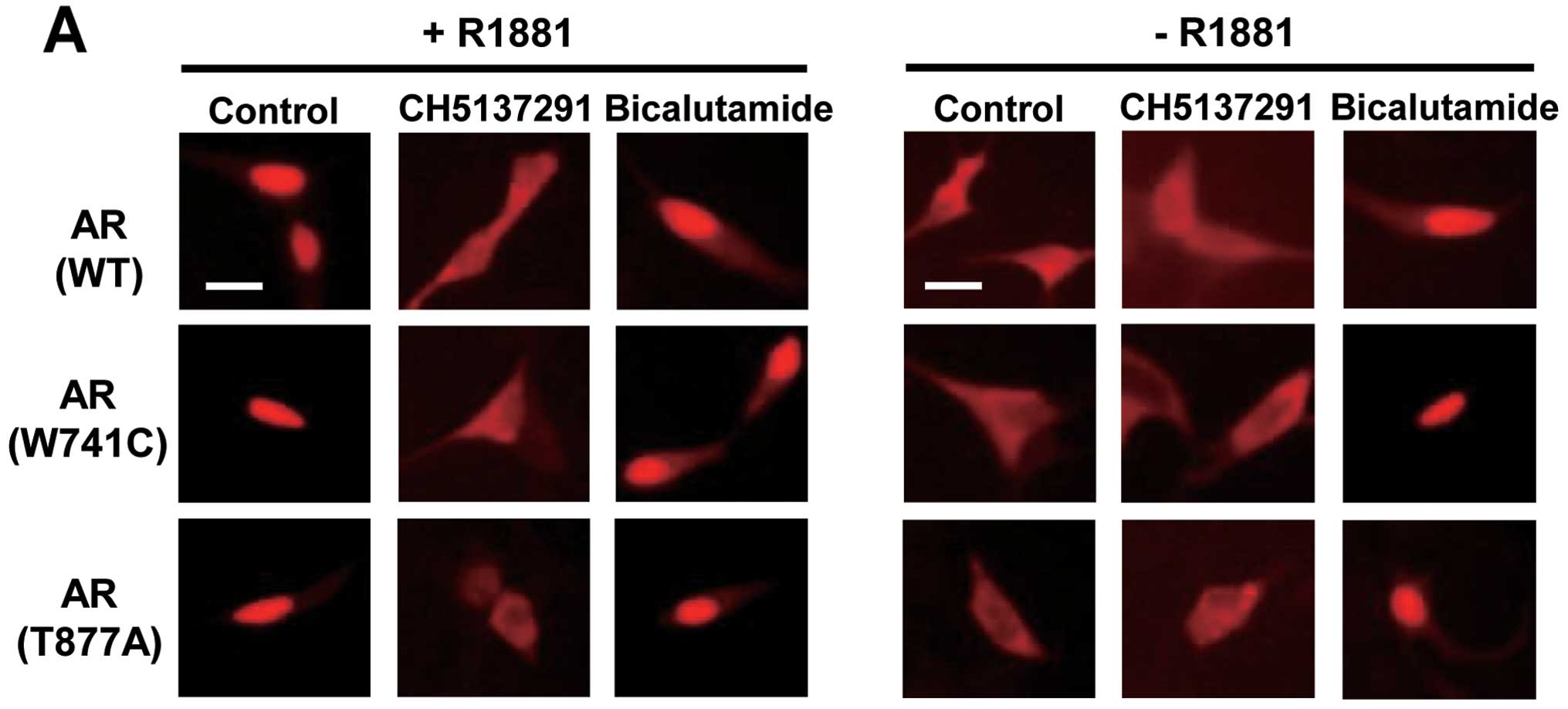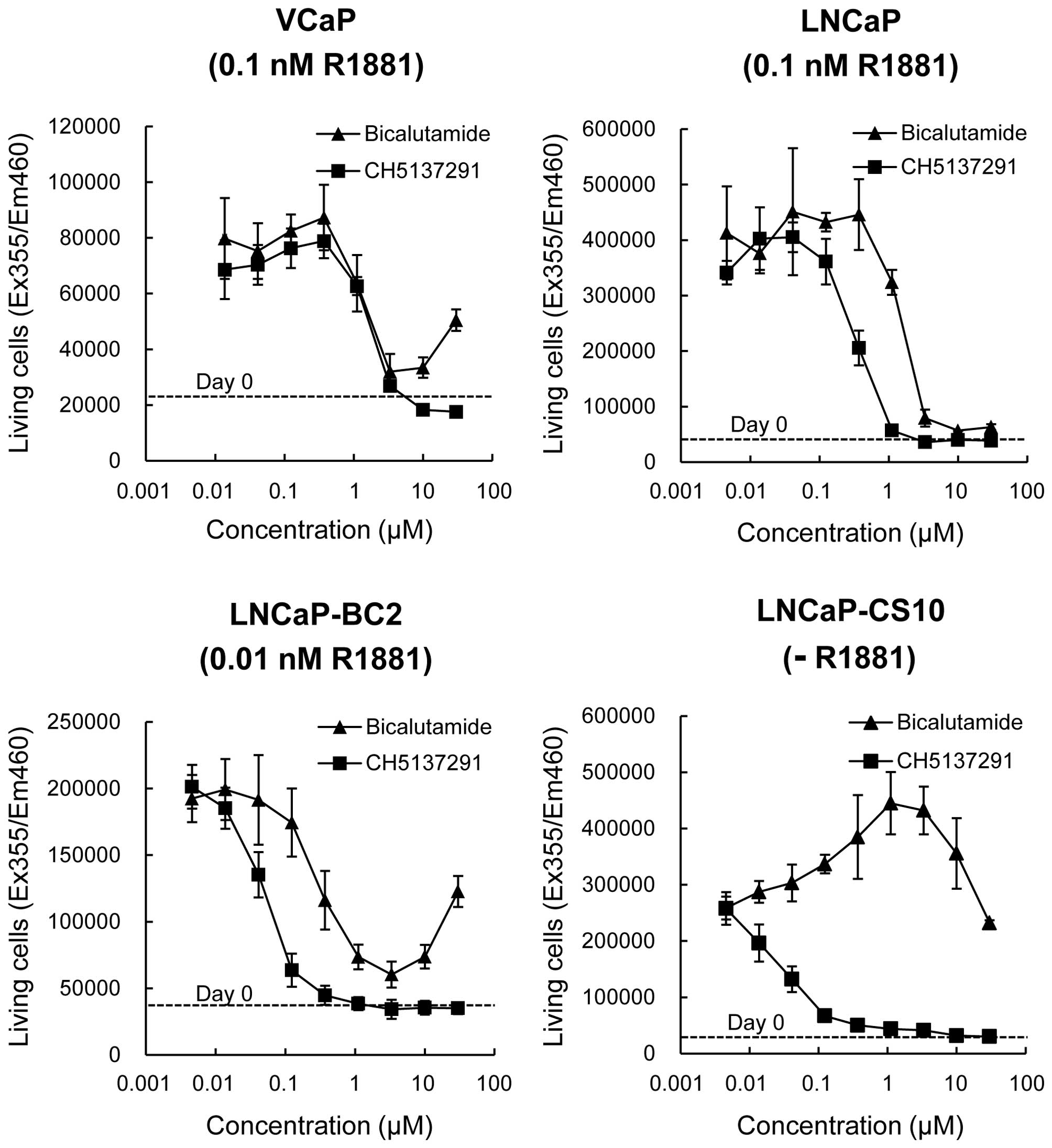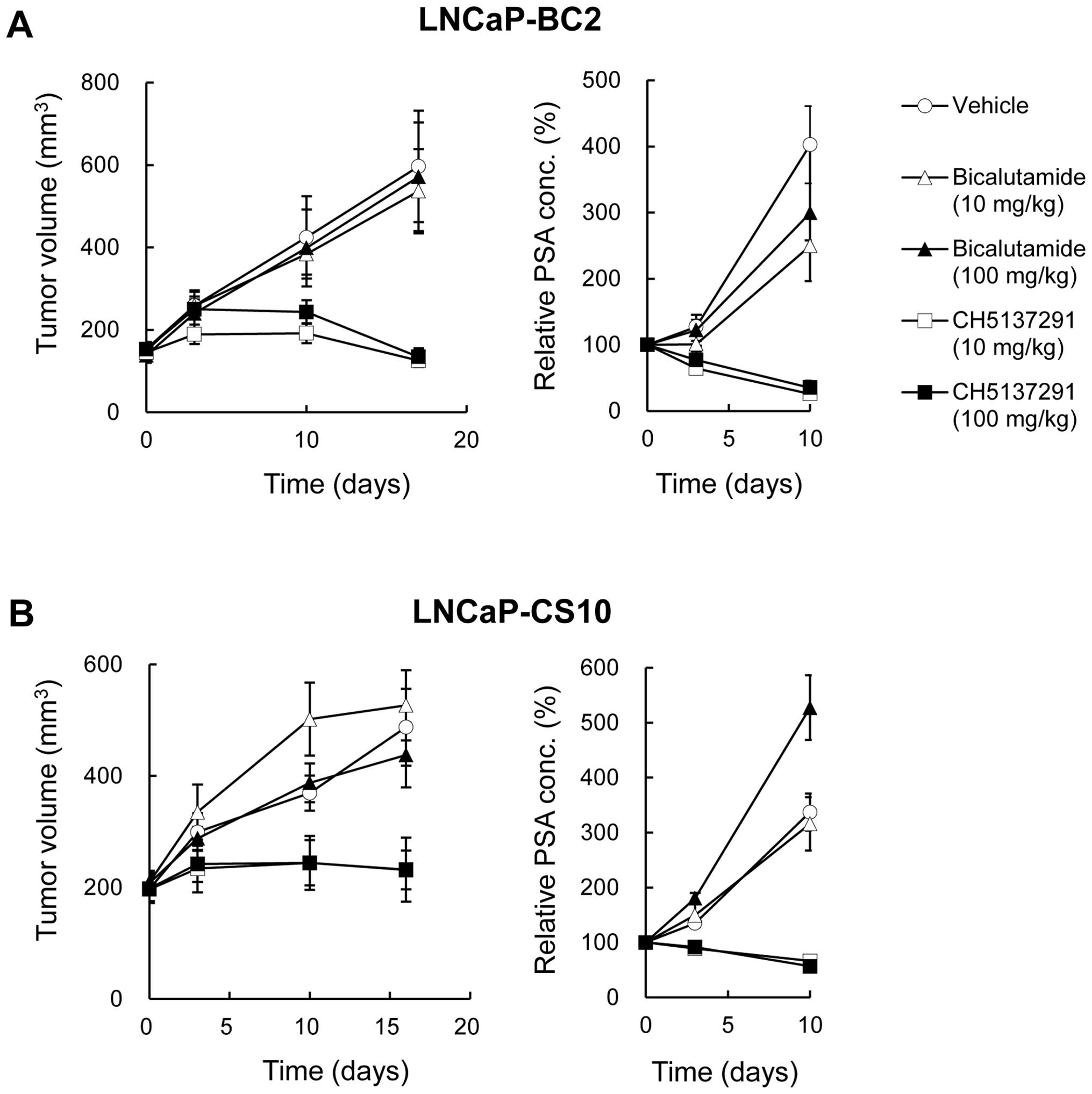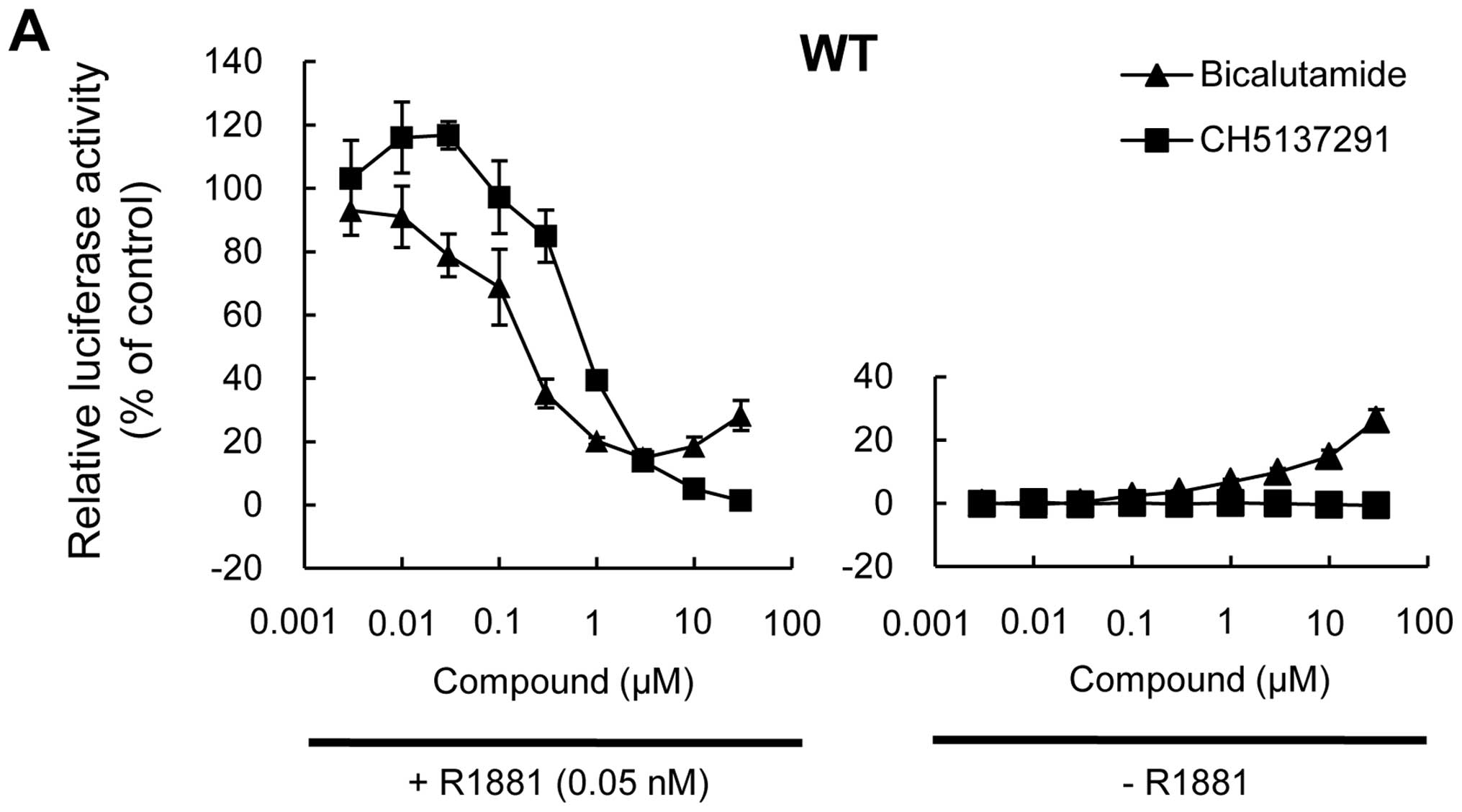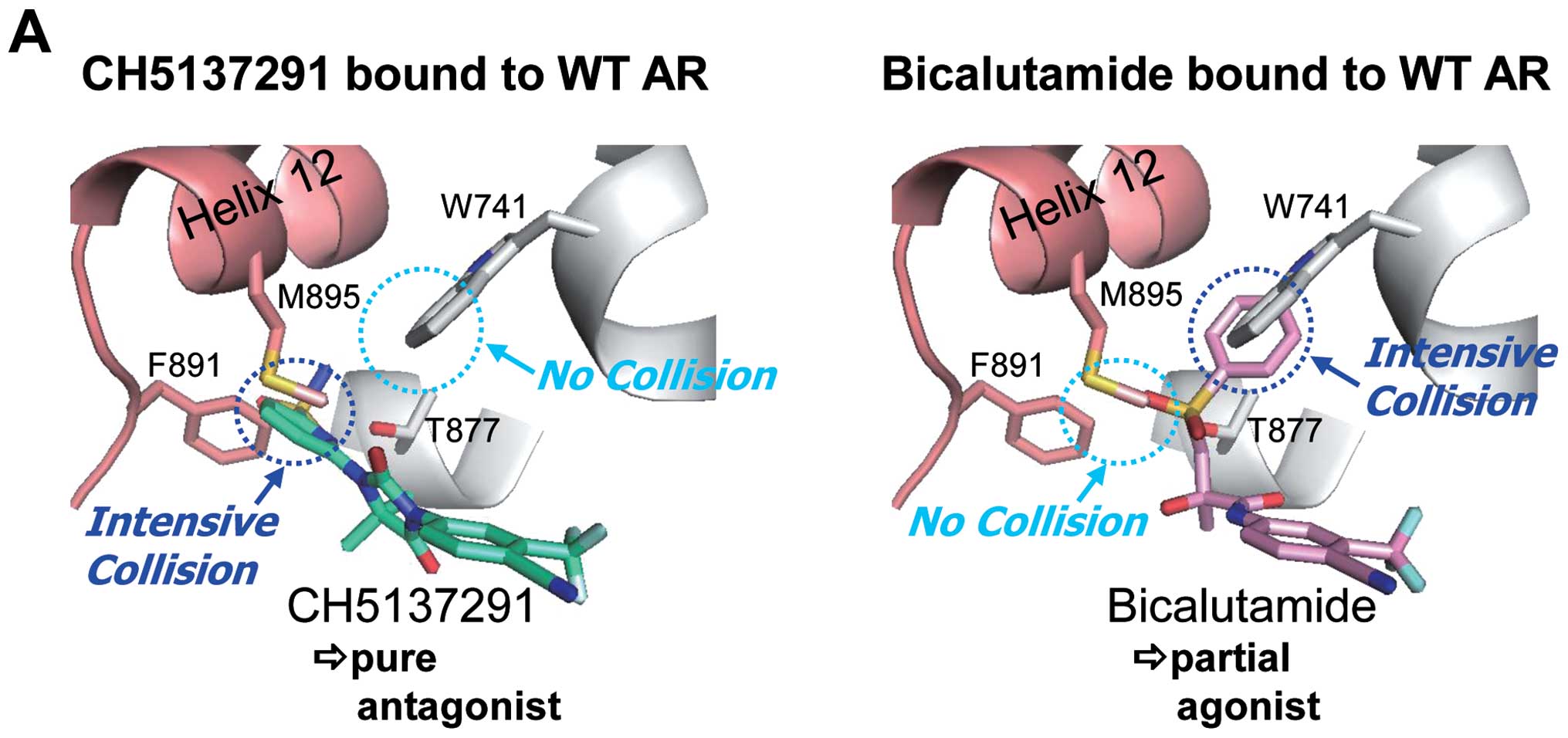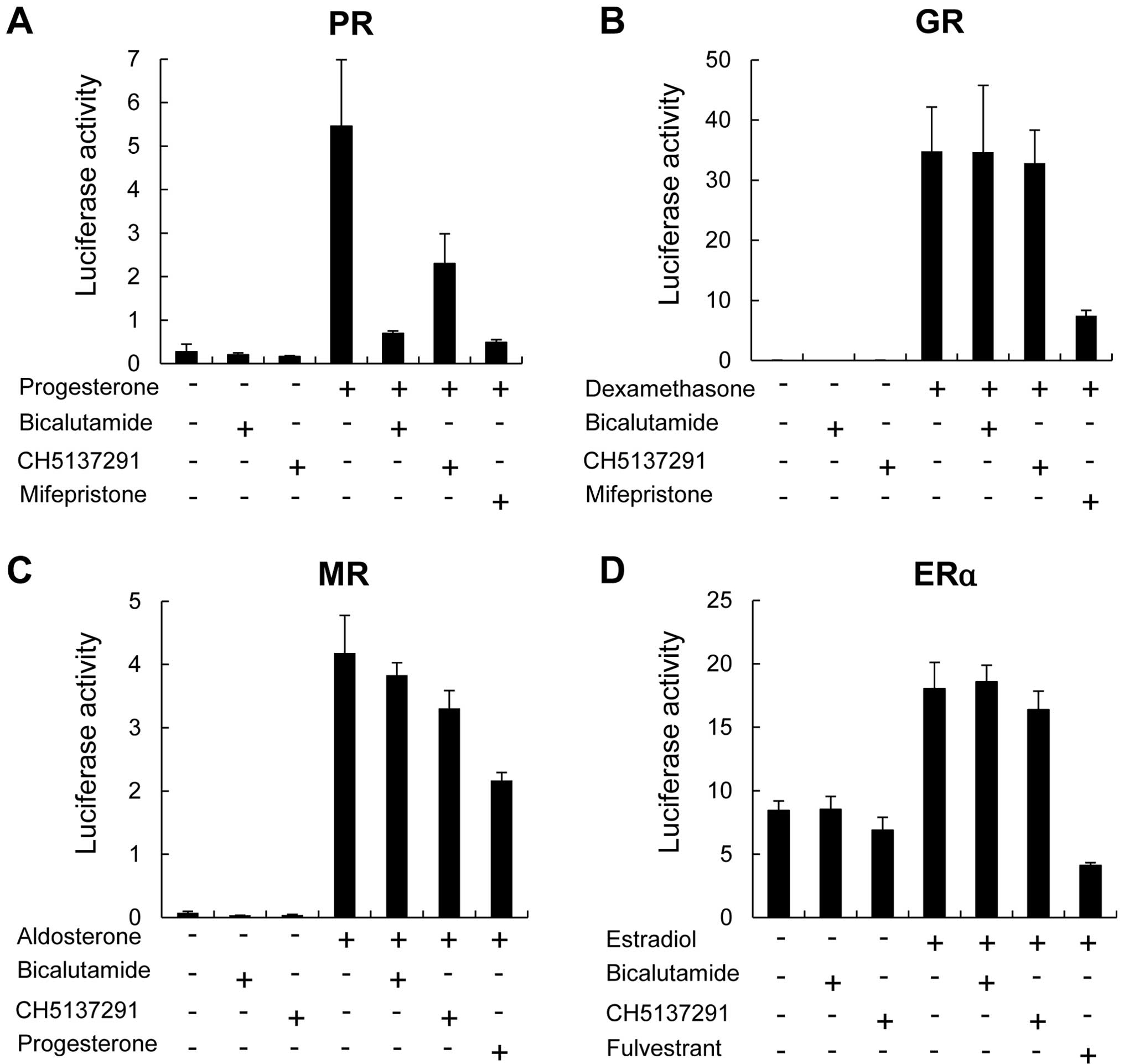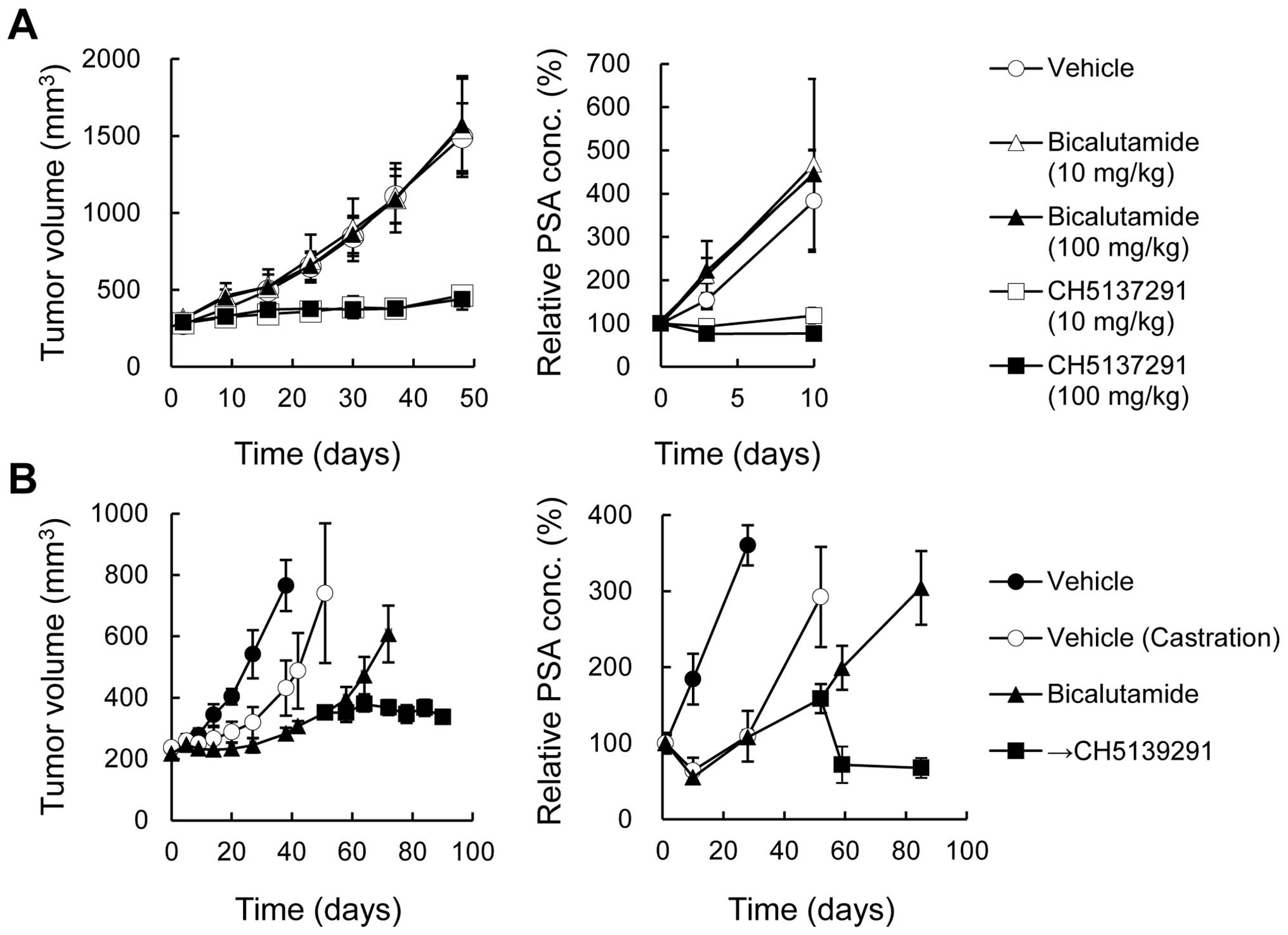|
1
|
Bosetti C, Bertuccio P, Levi F, Lucchini
F, Negri E and La Vecchia C: Cancer mortality in the European
Union, 1970–2003, with a joinpoint analysis. Ann Oncol. 19:631–640.
2008. View Article : Google Scholar : PubMed/NCBI
|
|
2
|
Jemal A, Siegel R, Ward E, Hao Y, Xu J and
Thun MJ: Cancer statistics, 2009. CA Cancer J Clin. 59:225–249.
2009. View Article : Google Scholar : PubMed/NCBI
|
|
3
|
Matsuda T, Marugame T, Kamo K, Katanoda K,
Ajiki W and Sobue T: Cancer incidence and incidence rates in Japan
in 2002: based on data from 11 population-based cancer registries.
Jpn J Clin Oncol. 38:641–648. 2008. View Article : Google Scholar : PubMed/NCBI
|
|
4
|
Qiu D, Katanoda K, Marugame T and Sobue T:
A Joinpoint regression analysis of long-term trends in cancer
mortality in Japan (1958–2004). Int J Cancer. 124:443–448. 2009.
View Article : Google Scholar
|
|
5
|
Taplin ME and Balk SP: Androgen receptor:
a key molecule in the progression of prostate cancer to hormone
independence. J Cell Biochem. 91:483–490. 2004. View Article : Google Scholar : PubMed/NCBI
|
|
6
|
Arai Y, Akaza H, Deguchi T, et al:
Evaluation of quality of life in patients with previously untreated
advanced prostate cancer receiving maximum androgen blockade
therapy or LHRHa monotherapy: a multicenter, randomized,
double-blind, comparative study. J Cancer Res Clin Oncol.
134:1385–1396. 2008. View Article : Google Scholar : PubMed/NCBI
|
|
7
|
Roudier MP, True LD, Higano CS, et al:
Phenotypic heterogeneity of end-stage prostate carcinoma metastatic
to bone. Hum Pathol. 34:646–653. 2003. View Article : Google Scholar : PubMed/NCBI
|
|
8
|
Shah RB, Mehra R, Chinnaiyan AM, et al:
Androgen-independent prostate cancer is a heterogeneous group of
diseases: lessons from a rapid autopsy program. Cancer Res.
64:9209–9216. 2004. View Article : Google Scholar : PubMed/NCBI
|
|
9
|
Tomura A, Goto K, Morinaga H, et al: The
subnuclear three-dimensional image analysis of androgen receptor
fused to green fluorescence protein. J Biol Chem. 276:28395–28401.
2001. View Article : Google Scholar : PubMed/NCBI
|
|
10
|
Gregory CW, He B, Johnson RT, et al: A
mechanism for androgen receptor-mediated prostate cancer recurrence
after androgen deprivation therapy. Cancer Res. 61:4315–4319.
2001.PubMed/NCBI
|
|
11
|
Pienta KJ and Bradley D: Mechanisms
underlying the development of androgen-independent prostate cancer.
Clin Cancer Res. 12:1665–1671. 2006. View Article : Google Scholar : PubMed/NCBI
|
|
12
|
Visakorpi T, Hyytinen E, Koivisto P, et
al: In vivo amplification of the androgen receptor gene and
progression of human prostate cancer. Nat Genet. 9:401–406. 1995.
View Article : Google Scholar : PubMed/NCBI
|
|
13
|
Linja MJ, Savinainen KJ, Saramaki OR,
Tammela TL, Vessella RL and Visakorpi T: Amplification and
overexpression of androgen receptor gene in hormone-refractory
prostate cancer. Cancer Res. 61:3550–3555. 2001.PubMed/NCBI
|
|
14
|
Chen CD, Welsbie DS, Tran C, et al:
Molecular determinants of resistance to antiandrogen therapy. Nat
Med. 10:33–39. 2004. View
Article : Google Scholar : PubMed/NCBI
|
|
15
|
Culig Z, Hobisch A, Cronauer MV, et al:
Androgen receptor activation in prostatic tumor cell lines by
insulin-like growth factor-I, keratinocyte growth factor, and
epidermal growth factor. Cancer Res. 54:5474–5478. 1994.PubMed/NCBI
|
|
16
|
Gioeli D, Ficarro SB, Kwiek JJ, et al:
Androgen receptor phosphorylation. Regulation and identification of
the phosphorylation sites. J Biol Chem. 277:29304–29314. 2002.
View Article : Google Scholar : PubMed/NCBI
|
|
17
|
Ueda T, Mawji NR, Bruchovsky N and Sadar
MD: Ligand-independent activation of the androgen receptor by
interleukin-6 and the role of steroid receptor coactivator-1 in
prostate cancer cells. J Biol Chem. 277:38087–38094. 2002.
View Article : Google Scholar : PubMed/NCBI
|
|
18
|
Debes JD, Schmidt LJ, Huang H and Tindall
DJ: p300 mediates androgen-independent transactivation of the
androgen receptor by interleukin 6. Cancer Res. 62:5632–5636.
2002.PubMed/NCBI
|
|
19
|
Gregory CW, Whang YE, McCall W, et al:
Heregulin-induced activation of HER2 and HER3 increases androgen
receptor transactivation and CWR-R1 human recurrent prostate cancer
cell growth. Clin Cancer Res. 11:1704–1712. 2005. View Article : Google Scholar : PubMed/NCBI
|
|
20
|
Culig Z, Steiner H, Bartsch G and Hobisch
A: Interleukin-6 regulation of prostate cancer cell growth. J Cell
Biochem. 95:497–505. 2005. View Article : Google Scholar : PubMed/NCBI
|
|
21
|
Ponguta LA, Gregory CW, French FS and
Wilson EM: Site-specific androgen receptor serine phosphorylation
linked to epidermal growth factor-dependent growth of
castration-recurrent prostate cancer. J Biol Chem. 283:20989–21001.
2008. View Article : Google Scholar : PubMed/NCBI
|
|
22
|
Zhao XY, Malloy PJ, Krishnan AV, et al:
Glucocorticoids can promote androgen-independent growth of prostate
cancer cells through a mutated androgen receptor. Nat Med.
6:703–706. 2000. View
Article : Google Scholar : PubMed/NCBI
|
|
23
|
Shi XB, Ma AH, Xia L, Kung HJ and de Vere
White RW: Functional analysis of 44 mutant androgen receptors from
human prostate cancer. Cancer Res. 62:1496–1502. 2002.PubMed/NCBI
|
|
24
|
Taplin ME, Rajeshkumar B, Halabi S, et al:
Androgen receptor mutations in androgen-independent prostate
cancer: Cancer and Leukemia Group B Study 9663. J Clin Oncol.
21:2673–2678. 2003. View Article : Google Scholar : PubMed/NCBI
|
|
25
|
Hara T, Nakamura K, Araki H, Kusaka M and
Yamaoka M: Enhanced androgen receptor signaling correlates with the
androgen-refractory growth in a newly established MDA PCa 2b-hr
human prostate cancer cell subline. Cancer Res. 63:5622–5628.
2003.PubMed/NCBI
|
|
26
|
Yoshida T, Kinoshita H, Segawa T, et al:
Antiandrogen bicalutamide promotes tumor growth in a novel
androgen-dependent prostate cancer xenograft model derived from a
bicalutamide-treated patient. Cancer Res. 65:9611–9616. 2005.
View Article : Google Scholar : PubMed/NCBI
|
|
27
|
Tachibana K, Imaoka I, Yoshino H, et al:
Discovery of 7alpha-substituted dihydrotestosterones as androgen
receptor pure antagonists and their structure-activity
relationships. Bioorg Med Chem. 15:174–185. 2007. View Article : Google Scholar
|
|
28
|
Kawata H, Ishikura N, Watanabe M,
Nishimoto A, Tsunenari T and Aoki Y: Prolonged treatment with
bicalutamide induces androgen receptor overexpression and androgen
hypersensitivity. Prostate. 70:745–754. 2010. View Article : Google Scholar : PubMed/NCBI
|
|
29
|
Ishikura N, Kawata H, Nishimoto A,
Nakamura R, Ishii N and Aoki Y: Establishment and characterization
of an androgen receptor-dependent, androgen-independent human
prostate cancer cell line, LNCaP-CS10. Prostate. 70:457–466.
2010.
|
|
30
|
Hara T, Miyazaki J, Araki H, et al: Novel
mutations of androgen receptor: a possible mechanism of
bicalutamide withdrawal syndrome. Cancer Res. 63:149–153.
2003.PubMed/NCBI
|
|
31
|
Osborne CK, Coronado-Heinsohn EB,
Hilsenbeck SG, et al: Comparison of the effects of a pure steroidal
antiestrogen with those of tamoxifen in a model of human breast
cancer. J Natl Cancer Inst. 87:746–750. 1995. View Article : Google Scholar : PubMed/NCBI
|
|
32
|
Hoffmann J, Bohlmann R, Heinrich N, et al:
Characterization of new estrogen receptor destabilizing compounds:
effects on estrogen-sensitive and tamoxifen-resistant breast
cancer. J Natl Cancer Inst. 96:210–218. 2004. View Article : Google Scholar : PubMed/NCBI
|
|
33
|
Osborne CK, Pippen J, Jones SE, et al:
Double-blind, randomized trial comparing the efficacy and
tolerability of fulvestrant versus anastrozole in postmenopausal
women with advanced breast cancer progressing on prior endocrine
therapy: results of a North American trial. J Clin Oncol.
20:3386–3395. 2002. View Article : Google Scholar : PubMed/NCBI
|
|
34
|
Howell A, Robertson JF, Quaresma Albano J,
et al: Fulvestrant, formerly ICI 182,780, is as effective as
anastrozole in postmenopausal women with advanced breast cancer
progressing after prior endocrine treatment. J Clin Oncol.
20:3396–3403. 2002. View Article : Google Scholar : PubMed/NCBI
|
|
35
|
Tran C, Ouk S, Clegg NJ, et al:
Development of a second-generation antiandrogen for treatment of
advanced prostate cancer. Science. 324:787–790. 2009. View Article : Google Scholar : PubMed/NCBI
|
|
36
|
Yoshino H, Sato H, Shiraishi T, et al:
Design and synthesis of an androgen receptor pure antagonist
(CH5137291) for the treatment of castration-resistant prostate
cancer. Bioorg Med Chem. 18:8150–8157. 2010. View Article : Google Scholar : PubMed/NCBI
|
|
37
|
Kawata H, Arai S, Nakagawa T, et al:
Biological properties of androgen receptor pure antagonist for
treatment of castration-resistant prostate cancer: optimization
from lead compound to CH5137291. Prostate. 71:1344–1356.
2011.PubMed/NCBI
|
|
38
|
Corey E, Quinn JE, Buhler KR, et al: LuCaP
35: a new model of prostate cancer progression to androgen
independence. Prostate. 55:239–246. 2003. View Article : Google Scholar : PubMed/NCBI
|
|
39
|
Tachibana K, Imaoka I, Shiraishi T, et al:
Discovery of an orally-active nonsteroidal androgen receptor pure
antagonist and the structure-activity relationships of its
derivatives. Chem Pharm Bull. 56:1555–1561. 2008. View Article : Google Scholar : PubMed/NCBI
|
|
40
|
Tachibana K, Imaoka I, Yoshino H, et al:
Discovery and structure-activity relationships of new steroidal
compounds bearing a carboxy-terminal side chain as androgen
receptor pure antagonists. Bioorg Med Chem Lett. 17:5573–5576.
2007. View Article : Google Scholar : PubMed/NCBI
|
|
41
|
Bohl CE, Gao W, Miller DD, Bell CE and
Dalton JT: Structural basis for antagonism and resistance of
bicalutamide in prostate cancer. Proc Natl Acad Sci USA.
102:6201–6206. 2005. View Article : Google Scholar : PubMed/NCBI
|
|
42
|
O’Donnell A, Judson I, Dowsett M, et al:
Hormonal impact of the 17alpha-hydroxylase/C(17,20)-lyase inhibitor
abiraterone acetate (CB7630) in patients with prostate cancer. Br J
Cancer. 90:2317–2325. 2004.
|
|
43
|
Fizazi K, Scher HI, Molina A, et al:
Abiraterone acetate for treatment of metastatic
castration-resistant prostate cancer: final overall survival
analysis of the COU-AA-301 randomised, double-blind,
placebo-controlled phase 3 study. Lancet Oncol. 13:983–992. 2012.
View Article : Google Scholar : PubMed/NCBI
|
|
44
|
Beer TM, Armstrong AJ, Rathkopf DE, et al:
Enzalutamide in metastatic prostate cancer before chemotherapy. N
Engl J Med. 371:424–433. 2014. View Article : Google Scholar : PubMed/NCBI
|
|
45
|
Longui CA: Glucocorticoid therapy:
minimizing side effects. J Pediatr (Rio J). 83:S163–S177. 2007.
View Article : Google Scholar
|
|
46
|
Joffe HV and Adler GK: Effect of
aldosterone and mineralocorticoid receptor blockade on vascular
inflammation. Heart Fail Rev. 10:31–37. 2005. View Article : Google Scholar : PubMed/NCBI
|















